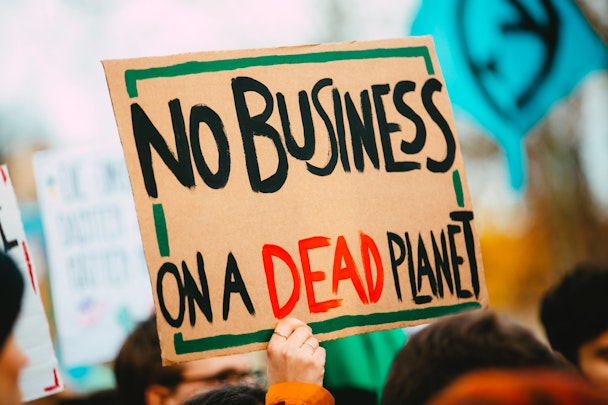Climate action for agencies 101: the case for change
In this series, we'll talk to marketing leaders about how they've embedded climate action into their agencies. Today, we talk to Sam Zindel, managing director at Propellernet and founder of Low Carbon Leaders, about how to get the ball rolling and making the case for change.

Marketers, like those in any business, must become sustainable or face challenges / Markus Spiske via Unsplash
What role do marketers have in helping to limit the impact of climate change? Some leaders in the industry have been ahead of the curve, driving climate awareness and action internally and with their clients since before ‘sustainability’ became a recognized industry term.
Others to this day remain – pun warning – at sea with understanding the problem, their role in it, and the correct course of action. There's so much information you could get lost in that could just go over your head, says Sam Zindel, managing director at Propellernet.
Having decided that his agency would do their bit, it became clear that figuring out what ‘their bit’ amounted to would be a challenge itself.
“I quickly realized that the vast majority of carbon emissions and greenhouse gasses are generated by air travel, construction, agriculture, manufacturing, and distribution,” he says. But what of a company that consists of “a bunch of people and some laptops and one office that’s [since the pandemic] not used as much as it used to be?”
The answer is that most agencies “wouldn't even show up as a speck of dust in the atmosphere” amid the 33 gigatons of carbon pumped into the atmosphere each year; an agency like Zindel’s is “only just above zero on paper, when you look at our emissions”.
Crucially, that doesn’t mean that action is unnecessary; international cooperative targets assume that every polluter, however small, will do their part; if you don’t reduce or mitigate your emissions, someone else will have to on your behalf in order for those targets to be hit.
The opportunity of net zero
And that’s not to say that the case for action is purely negative. To put it another way, “if an existential crisis doesn't get you motivated, then a good business opportunity might… And if not a good business opportunity, then mitigating the risks that you might go out of business at some point in the future if you're not acting – that might as well.”
Quite simply, will a carbon-neutral or -negative business be better-off than one that never took any action? “The whole economy is shifting to a low carbon economy. We want to be a part of that, because that's the future of our business, it's the future of our clients' businesses, it's the future of our workforce.”
Here, the ‘negative’ and ‘positive’ cases for change start to merge: “increasingly, companies will be incentivized or punished.” Already now, large corporations are starting to declare their carbon-related risk under the rubric of the internationally-growing Task Force on Climate-Related Financial Disclosures; procurement processes for government contracts around the world increasingly require declarations of science-based net-zero plans; and with more and more businesses making commitments across their own supply chains, contracts may become increasingly closed-off to those without their sustainability bona fides in place.
Verifiable, accredited action, in other words, could be seen as “future-proofing your inbound offering”; Zindel himself mentions at least one major contract that he’s sure he wouldn’t have won without connecting with the client over a mutual commitment to climate action.
Action starts with action
So, what would Zindel – a leader whose own list of initiatives include setting up the Low Carbon Leaders network; signing up to the Million Tree Pledge and the We Mean Business Coalition; and investigating investment in a sea kelp farm – recommend as a first step?
Action now; questions later: “Doing something now, however small, is important. Whatever you do now will have a positive impact on the environment at the very least – but probably a strategic business benefit as well. Plant one tree now. It will cost you 12p through the Ecologi platform.”
(He acknowledges that some have doubts about tree planting but insists that properly considered tree-planting is actually very helpful indeed – but those are debates for another day). And if that 12p investment is too much, perhaps you can pay for it by switching to renewable energy which now, in the UK at least, is cheaper than the fossil-fuel alternatives that are likely the biggest emissions factor for most digital businesses – a little bit of offsetting in microcosm.

